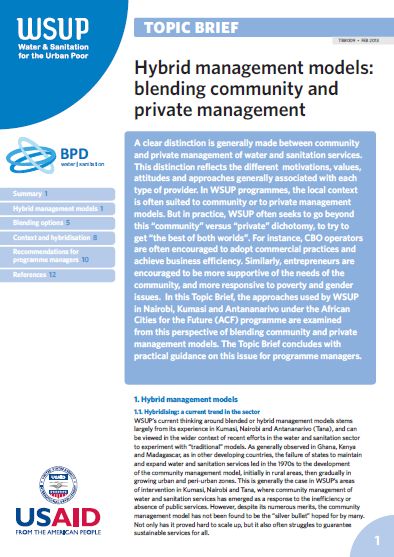
Published in: 2013
Publisher:
Building Partnerships for Development (BPD), Water and Sanitation for the Urban Poor (WSUP), UK
Author:
Tiberghien, J.-E.
Uploaded by:
SuSanA secretariat
Partner profile:
common upload
6355 Views
83 Downloads
Location of library entry
Content - Summary
4th of 4 learning documents by BPD on WSUP's African Cities for the Future programme: In this Topic Brief, the approaches used by WSUP in Nairobi, Kumasi and Antananarivo are examined from the perspective of blending community and private management models. It concludes with practical guidance on this issue for programme managers.
A clear distinction is generally made between community and private management of water and sanitation services. This distinction reflects the different motivations, values, attitudes and approaches generally associated with each type of provider. In WSUP programmes, the local context is often suited to community or to private management models. But in practice, WSUP often seeks to go beyond this “community” versus “private” dichotomy, to try to get “the best of both worlds”. For instance, CBO operators are often encouraged to adopt commercial practices and achieve business efficiency. Similarly, entrepreneurs are encouraged to be more supportive of the needs of the community, and more responsive to poverty and gender issues. In this Topic Brief, the approaches used by WSUP in Nairobi, Kumasi and Antananarivo under the African Cities for the Future (ACF) programme are examined from this perspective of blending community and private management models. The Topic Brief concludes with practical guidance on this issue for programme managers.
Bibliographic information
Tiberghien, J.-E. (2013). Hybrid Management Models: Blending Community and Private Management. Building Partnerships for Development (BPD), Water and Sanitation for the Urban Poor (WSUP), UK
Filter tags
English Operation, maintenance and sustainable services (WG10) Sub-Saharan Africa














